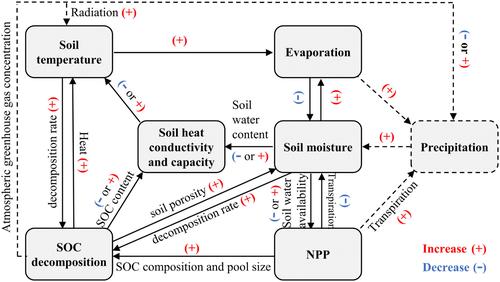当前位置:
X-MOL 学术
›
Glob. Change Biol.
›
论文详情
Our official English website, www.x-mol.net, welcomes your feedback! (Note: you will need to create a separate account there.)
Evaluation of effects of heat released from SOC decomposition on soil carbon stock and temperature
Global Change Biology ( IF 10.8 ) Pub Date : 2024-07-01 , DOI: 10.1111/gcb.17391 Ye Huang 1, 2 , Lin Huang 1 , Chunjing Qiu 2, 3 , Philippe Ciais 2
Global Change Biology ( IF 10.8 ) Pub Date : 2024-07-01 , DOI: 10.1111/gcb.17391 Ye Huang 1, 2 , Lin Huang 1 , Chunjing Qiu 2, 3 , Philippe Ciais 2
Affiliation

|
Heat released from soil organic carbon (SOC) decomposition (referred to as microbial heat hereafter) could alter the soil's thermal and hydrological conditions, subsequently modulate SOC decomposition and its feedback with climate. While understanding this feedback is crucial for shaping policy to achieve specific climate goal, it has not been comprehensively assessed. This study employs the ORCHIDEE‐MICT model to investigate the effects of microbial heat, referred to as heating effect, focusing on their impacts on SOC accumulation, soil temperature and net primary productivity (NPP), as well as implication on land‐climate feedback under two CO2 emissions scenarios (RCP2.6 and RCP8.5). The findings reveal that the microbial heat decreases soil carbon stock, predominantly in upper layers, and elevates soil temperatures, especially in deeper layers. This results in a marginal reduction in global SOC stocks due to accelerated SOC decomposition. Altered seasonal cycles of SOC decomposition and soil temperature are simulated, with the most significant temperature increase per unit of microbial heat (0.31 K J−1 ) occurring at around 273.15 K (median value of all grid cells where air temperature is around 273.15 K). The heating effect leads to the earlier loss of permafrost area under RCP8.5 and hinders its restoration under RCP2.6 after peak warming. Although elevated soil temperature under climate warming aligns with expectation, the anticipated accelerated SOC decomposition and large amplifying feedback on climate warming were not observed, mainly because of reduced modeled initial SOC stock and limited NPP with heating effect. These underscores the multifaceted impacts of microbial heat. Comprehensive understanding of these effects would be vital for devising effective climate change mitigation strategies in a warming world.
中文翻译:

SOC分解放热对土壤碳储量和温度的影响评价
土壤有机碳(SOC)分解释放的热量(以下简称微生物热)可以改变土壤的热和水文条件,从而调节SOC分解及其对气候的反馈。虽然了解这种反馈对于制定政策以实现具体的气候目标至关重要,但尚未对其进行全面评估。本研究采用 ORCHIDEE-MICT 模型研究微生物热量的影响,称为加热效应,重点关注其对 SOC 积累、土壤温度和净初级生产力(NPP)的影响,以及对陆地气候反馈的影响。两种二氧化碳排放情景(RCP2.6 和 RCP8.5)。研究结果表明,微生物热量降低了土壤碳储量(主要是上层土壤),并提高了土壤温度(尤其是深层土壤)。由于 SOC 分解加速,导致全球 SOC 库存略有减少。模拟了 SOC 分解和土壤温度的季节性循环变化,每单位微生物热量 (0.31 K J−1) 的温度升高最显着发生在 273.15 K 左右(气温约为 273.15 K 的所有网格单元的中值)。加热效应导致RCP8.5下多年冻土面积提前消失,并阻碍RCP2.6下升温高峰后的恢复。尽管气候变暖下土壤温度升高符合预期,但并未观察到预期的 SOC 分解加速和气候变暖的大放大反馈,主要是因为模型初始 SOC 储量减少,且加热效应下的 NPP 有限。这些强调了微生物热量的多方面影响。 全面了解这些影响对于在变暖的世界中制定有效的气候变化缓解战略至关重要。
更新日期:2024-07-01
中文翻译:

SOC分解放热对土壤碳储量和温度的影响评价
土壤有机碳(SOC)分解释放的热量(以下简称微生物热)可以改变土壤的热和水文条件,从而调节SOC分解及其对气候的反馈。虽然了解这种反馈对于制定政策以实现具体的气候目标至关重要,但尚未对其进行全面评估。本研究采用 ORCHIDEE-MICT 模型研究微生物热量的影响,称为加热效应,重点关注其对 SOC 积累、土壤温度和净初级生产力(NPP)的影响,以及对陆地气候反馈的影响。两种二氧化碳排放情景(RCP2.6 和 RCP8.5)。研究结果表明,微生物热量降低了土壤碳储量(主要是上层土壤),并提高了土壤温度(尤其是深层土壤)。由于 SOC 分解加速,导致全球 SOC 库存略有减少。模拟了 SOC 分解和土壤温度的季节性循环变化,每单位微生物热量 (0.31 K J−1) 的温度升高最显着发生在 273.15 K 左右(气温约为 273.15 K 的所有网格单元的中值)。加热效应导致RCP8.5下多年冻土面积提前消失,并阻碍RCP2.6下升温高峰后的恢复。尽管气候变暖下土壤温度升高符合预期,但并未观察到预期的 SOC 分解加速和气候变暖的大放大反馈,主要是因为模型初始 SOC 储量减少,且加热效应下的 NPP 有限。这些强调了微生物热量的多方面影响。 全面了解这些影响对于在变暖的世界中制定有效的气候变化缓解战略至关重要。











































 京公网安备 11010802027423号
京公网安备 11010802027423号